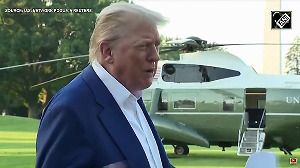The threat of war in Iraq and fear of terrorism in the United States and Britain pushed oil prices to near two-year highs on Thursday, drove investors into the safety of bonds but battered stocks and the dollar.
With new concerns about security adding to persistent uncertainty about US attempts to disarm Iraq, investors showed little inclination to take risks.
"Everywhere you look there are TV screens showing troops patrolling (London's) Heathrow Airport, and any sort of news like this clearly creates an environment in which people are certainly not investing in anything more risky than highly-rated bonds," said Commerzbank analyst Christoph Rieger.
The United States and Britain have taken extraordinary measures to protect against possible attacks, including setting up anti-aircraft batteries in the US capital.
A seemingly unstoppable march towards another Gulf war, meanwhile, continued to gain pace. The Washington Post reported that US special operations forces were operating in Iraq, laying the foundation for a US-led invasion.
Western allies remained divided -- putting huge strains on the North Atlantic Treaty Organisation. Financial markets were keenly awaiting a report to the UN Security Council on Friday by chief arms inspector Hans Blix.
"Trading is cautious as investors wait for the outcome on the Iraq issue. That is the overriding concern and I don't think the market is going to change very much until that is clear," said Steven Lim, a fund manager at Daiwa SB Investments in Singapore.
Barrels and bonds
Oil prices climbed. IPE Brent crude oil futures opened near two-year highs, also pressured by thinned stocks of US crude and oil products.
Brent March crude, which expires at close of trade, was 27 cents higher at $32.72 a barrel, near the fresh two-year high of $32.83 set on Wednesday. The April contract was trading up 30 cents at $32.25 a barrel.
"Balancing bullish fundamentals with political factors, we'll probably see a trading range between $30 and $40 a barrel over the next month," said Gordon Kwan, oil and gas analyst at HSBC in Hong Kong.
A flight to safety boosted euro zone government bonds, pushing yields to new lows.
The two-year Schatz yields were down less than a basis point at 2.408 per cent having hit a 2.385 per cent low. The benchmark 10-year bond yield was down 1.7 basis points at 3.946 per cent.
"It's a safe haven and people are getting panicky," one London-based bonds dealer said.
Stocks, dollar
Tensions put the dollar under renewed pressure against major currencies
"The market has not fully priced in the risk of a war on Iraq and there is still plenty of concern," said Jim McCormick, head of foreign exchange research at Lehman Brothers.
"The market will remain uncertain and it will get harder to trade, but the next few sessions will be critical and it will point to the downside risks for the dollar."
The dollar lost half a cent against the euro from late New York levels to $1.0796 , less than two cents away from its four-year low set this month. It fell two thirds of a per cent versus the safe-haven Swiss franc to 1.3595 francs and a third of a per cent on the yen to 120.74.
European shares fell. The FTSE Eurotop 300 index dropped 0.83 per cent as the pan-European blue chip benchmark skidded towards the six-year intra-day lows it hit late January.
The DJ Euro Stoxx 50 index dropped 0.78 per cent.
Earlier, Tokyo's Nikkei 225 average closed down 0.74 per cent or 64.51 points at 8,599.66, ending a two day winning streak.
Spot gold was trading at around $354 an ounce, subject to pressures from both profit takers and bargain hunters in a volatile climate.






